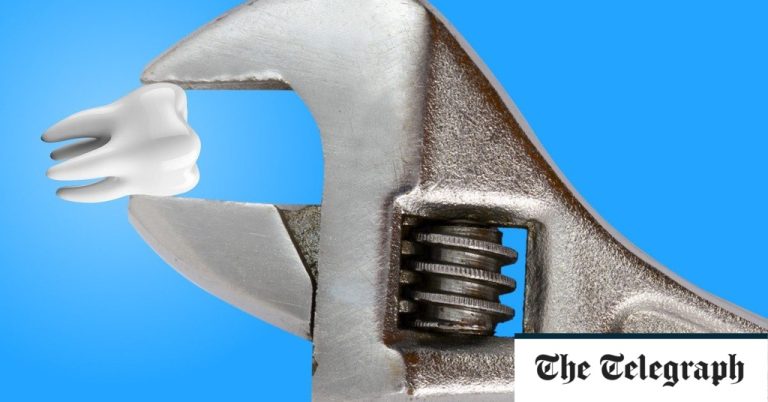Many have decided that the only alternative is to do it themselves – with mixed results. Tutorial videos on YouTube and TikTok garner hundreds of thousands of views. Some show people bragging that it only takes a few painkillers and a pair of pliers to loosen rotten teeth (note: these videos are definitely not for the faint of heart).
For those less willing to stick strong adhesives into their mouths than John, temporary filling kits are widely touted as a solution to missing caps and loose crowns. The kits sell for just £5 in Boots and have been a lifesaver for many during the pandemic when non-urgent dental work was not possible.
One woman says she tried this approach when her bridge fell out. Her dentist had retired and she couldn’t see a new one. The emergency kit worked and lasted, also relieving pain and tenderness. But they are not a long-term substitute for seeing a professional.
Eddie Crouch, 63, who chairs the BDA and enjoyed a 39-year career as a dentist in Birmingham, describes the kits as “a gap”. “Let’s say if you go away for the weekend and lose a filling on Friday and have a sharp edge of the tooth exposed, they’re perfect to get you through until you see a dentist on Monday,” he says. “But it’s not a long-term solution because it won’t help to keep replacing the temporary filler every week.”
According to those who work in dentistry, the problem with trying to fix problems yourself is that these home remedies can easily cause more problems than they solve. “The real problems are that if it’s just a method of delaying treatment – which in most cases is if you patch the teeth or try to do something to stick to the tooth – until you’re seen by a dentist the problem could be unsolved says Crouch.
“If you pull teeth with a pair of pliers, you’re likely to break the tooth and end up needing surgery, and you could develop a serious infection if you do a lot of damage to the soft tissue and gums. around the tooth,” he adds. “You could well make the problem worse and end up needing much more advanced treatment.
“Many people also self-medicate and one of the most common reasons people present to A&E with an overdose of pain relief is of a dental origin. They over-prescribe themselves with things like paracetamol and end up with serious complications.”
Crouch’s answer to the crisis is not a nationwide rollout of self-taught DIY dentists, but a reversal of the 8 per cent cut, in real terms, in NHS dental funding since 2010.
“It is really quite shocking that in a civilized country we live in, there is insufficient provision for even the most basic emergency care for people who cannot escape pain and have to resort to doing things in their own kitchens. he says. “It’s a throwback to the Victorian scenes of backstreet dentistry. It’s incredible.”
To avoid resorting to such drastic measures yourself, Crouch recommends using fluoride toothpaste, eating only sugary foods at meals and improving your brushing technique. “You can get some reveal tablets from the chemists to chew after you brush your teeth,” she advises. “They’ll show how well you’ve brushed, and you can improve your technique based on that to get rid of more plaque.”
Much easier than pulling out the pliers.

